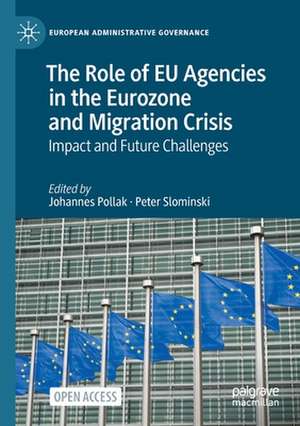The Role of EU Agencies in the Eurozone and Migration Crisis: Impact and Future Challenges: European Administrative Governance
Editat de Johannes Pollak, Peter Slominskien Limba Engleză Paperback – 2 dec 2021
Chapter 9 is available open access under a Creative Commons Attribution 4.0International License via link.springer.com.
| Toate formatele și edițiile | Preț | Express |
|---|---|---|
| Paperback (1) | 496.48 lei 43-57 zile | |
| Springer International Publishing – 2 dec 2021 | 496.48 lei 43-57 zile | |
| Hardback (1) | 500.73 lei 43-57 zile | |
| Springer International Publishing – dec 2020 | 500.73 lei 43-57 zile |
Din seria European Administrative Governance
- 17%
 Preț: 460.49 lei
Preț: 460.49 lei -
 Preț: 380.07 lei
Preț: 380.07 lei -
 Preț: 385.84 lei
Preț: 385.84 lei -
 Preț: 388.72 lei
Preț: 388.72 lei -
 Preț: 390.63 lei
Preț: 390.63 lei -
 Preț: 385.47 lei
Preț: 385.47 lei -
 Preț: 388.52 lei
Preț: 388.52 lei - 18%
 Preț: 1234.14 lei
Preț: 1234.14 lei - 15%
 Preț: 641.53 lei
Preț: 641.53 lei -
 Preț: 388.52 lei
Preț: 388.52 lei -
 Preț: 381.59 lei
Preț: 381.59 lei -
 Preț: 386.00 lei
Preț: 386.00 lei -
 Preț: 386.39 lei
Preț: 386.39 lei - 18%
 Preț: 722.58 lei
Preț: 722.58 lei - 15%
 Preț: 695.34 lei
Preț: 695.34 lei - 18%
 Preț: 1112.48 lei
Preț: 1112.48 lei - 18%
 Preț: 887.83 lei
Preț: 887.83 lei - 15%
 Preț: 703.20 lei
Preț: 703.20 lei - 15%
 Preț: 530.75 lei
Preț: 530.75 lei - 18%
 Preț: 781.00 lei
Preț: 781.00 lei - 15%
 Preț: 522.42 lei
Preț: 522.42 lei - 15%
 Preț: 694.22 lei
Preț: 694.22 lei - 18%
 Preț: 786.98 lei
Preț: 786.98 lei - 18%
 Preț: 729.53 lei
Preț: 729.53 lei
Preț: 496.48 lei
Preț vechi: 584.09 lei
-15% Nou
Puncte Express: 745
Preț estimativ în valută:
94.100€ • 99.45$ • 78.61£
94.100€ • 99.45$ • 78.61£
Carte tipărită la comandă
Livrare economică 07-21 aprilie
Preluare comenzi: 021 569.72.76
Specificații
ISBN-13: 9783030513856
ISBN-10: 3030513858
Pagini: 233
Ilustrații: XVII, 233 p. 1 illus.
Dimensiuni: 148 x 210 mm
Greutate: 0.34 kg
Ediția:1st ed. 2021
Editura: Springer International Publishing
Colecția Palgrave Macmillan
Seria European Administrative Governance
Locul publicării:Cham, Switzerland
ISBN-10: 3030513858
Pagini: 233
Ilustrații: XVII, 233 p. 1 illus.
Dimensiuni: 148 x 210 mm
Greutate: 0.34 kg
Ediția:1st ed. 2021
Editura: Springer International Publishing
Colecția Palgrave Macmillan
Seria European Administrative Governance
Locul publicării:Cham, Switzerland
Cuprins
Part I: Introduction.- Chapter 1: EU Agencies in times of crisis: An introduction.- Chapter 2: EU agencies and the politicized administration.- Part II: EU Agencies and the Eurozone crisis.- Chapter 3: Fit for Purpose or Drowning in Details? Institutional Evolution of the European Financial Sector Supervisory Authorities a Decade after the Global Financial Crisis.- Chapter 4: The Supervisory Board of the ECB: an agency-like body to stabilise the banking sector?.- Chapter 5: The Single Resolution Board: salient features, peculiarities and paradoxes.- Chapter 6: The Single Resolution Board: What About Accountability?.- Part III: EU Agencies and the migration crisis.- Chapter 7: The European Border and Coast Guard Agency Frontex after the migration crisis: Towards a ‘superagency’?.- Chapter 8: Beyond the ‘migration crisis’: the evolving role of EU agencies in the administrative governance of the asylum and external border control policies.- Chapter 9: Interagency Relations and the EU migration crisis: Strengthening of law enforcement through agencification?
Notă biografică
Johannes Pollak is Professor of International Relations and European Politics at Webster Vienna Private University, Austria, as well as senior research fellow at the Vienna Institute for Advanced Studies.
Peter Slominski is an assistant professor at the Department of Political Science/Centre for European Integration Research (eif) at the University of Vienna, Austria.
Textul de pe ultima copertă
The Eurozone and migration crises exposed severe gaps in the administrative capacity of the EU. This fine volume offers an insightful interdisciplinary and comparative analysis of how EU Agencies were strengthened in response.
—Frank Schimmelfennig, ETH Zürich, Switzerland
The proliferation, design and accountability of EU agencies is the focus of a vibrant academic debate. The editors have assembled a timely and stellar volume, which widens the research agenda on EU agencies.
—Berthold Rittberger, Ludwig Maximilian Universität München, Germany
In the literature on the crises that have beset the EU, the role of agencies has often been overlooked. This volume fills that gap, but it also does a lot more. Combining insights from legal scholars and political scientists, it contributes to important and topical debates about the role of agencies in EU governance.
—Hussein Kassim, Professor of Politics, University of East Anglia, UK, and ESRC Senior Fellow ‘The UK in a Changing Europe’
Johannes Pollak is Professor of International Relations and European Politics at Webster Vienna Private University, Austria, as well as senior research fellow at the Vienna Institute for Advanced Studies.
Peter Slominski is an assistant professor at the Department of Political Science/Centre for European Integration Research (eif) at the University of Vienna, Austria.
Chapter 9 is available open access under a Creative Commons Attribution 4.0 International License via link.springer.com.
Caracteristici
Examines how different EU agencies function during times of crisis management Uses the case studies of the Eurozone Crisis and the European migrant crises Outlines how EU agencies can shape policy during and after crises, and how their accountability is affected by crisis
